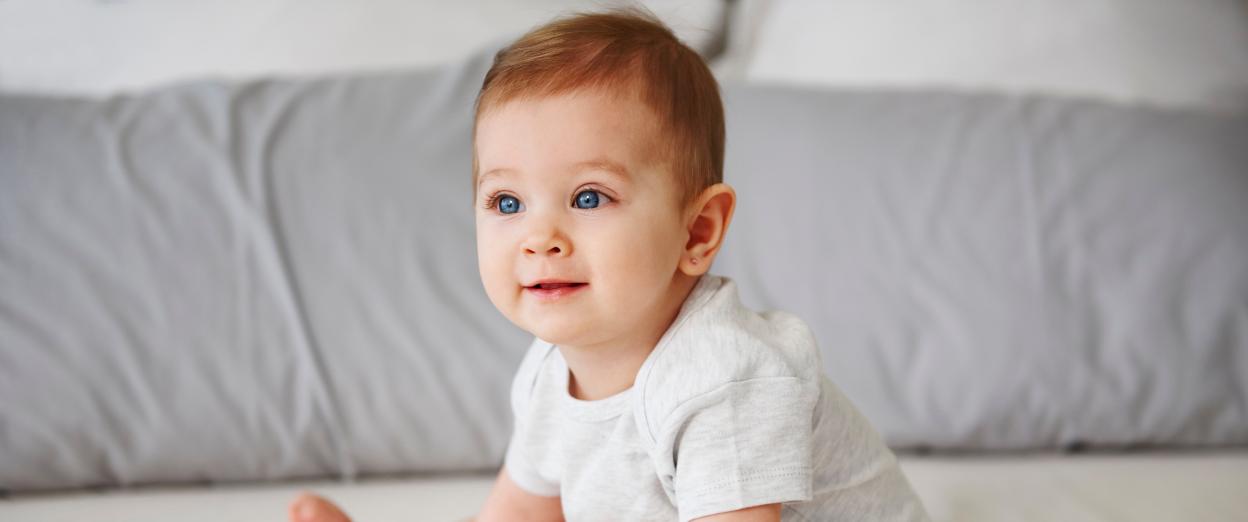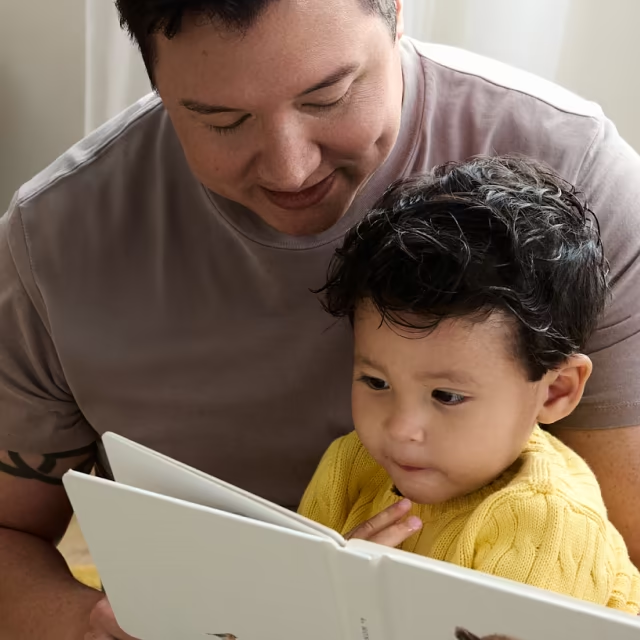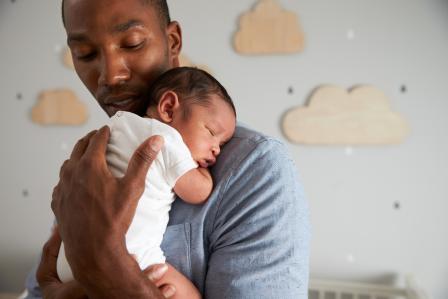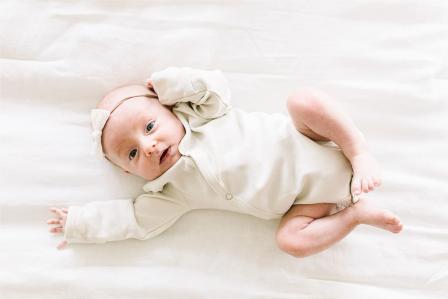Your little one is seven months old. They’re playing more, napping less, and staying awake longer during the day. I’d like to share sample 7 month sleep schedules and answer common sleep questions about wake windows for 7 month olds, dropping naps, sleep regressions, and more. Let’s dive in.

The 5–24 Month Collection
stars ( reviews)
My 5-24 Month Collection will give you a step-by-step, customizable plan to achieve 10-12 hours of independent night sleep, conquer nap transitions, and handle all of the bumps along the way. I’ll guide you through the entire sleep training process while you remain emotionally connected to your 7 month old.
Learn MoreWhat are the recommended wake windows for a 7 month old? How long can a 7 month old stay awake? anchor
Wake windows this month may start in the 2-3 hour range, but will expand to around 2.5-3.5 hours as your baby gets closer to eight months old.
Wake windows can also depend on the time of day. They start on the shorter end of the range, and then increase as the day progresses. For example, your seven month old may do best with a 2.5 hour wake window before the first nap, but may need a wake window of 3-3.5 hours before bedtime.
It’s also common between 7-8 months for babies to show signs it’s time to drop a nap. When your baby transitions from 3 naps to 2, their wake windows will need to increase as well.
Here's a general routine for wake windows at this age if your baby is still taking 3 naps:
About 2.5 hours after wake time = Nap 1
About 2.5 hours after the end of Nap 1 = Nap 2
About 2.5 hours after the end of Nap 2 = Nap 3
About 2.5-3 hours after the end of Nap 3 = Bedtime
And here's the routine for wake windows at this age once your baby transitions to 2 naps:
About 2.5-3 hours after wake time = Nap 1
About 3 hours after the end of Nap 1 = Nap 2
About 3-3.5 hours after the end of Nap 2 = Bedtime
What is a sample sleep schedule for a 7 month old? anchor
Schedules for a 7 month old depend on being responsive to each baby’s individual needs. Your days will vary depending on your little one’s wake time, nap lengths, and wake windows. Here are two sample schedules — one with 3 naps and one with 2 naps — to help you see how a day might play out with a 7 month old.
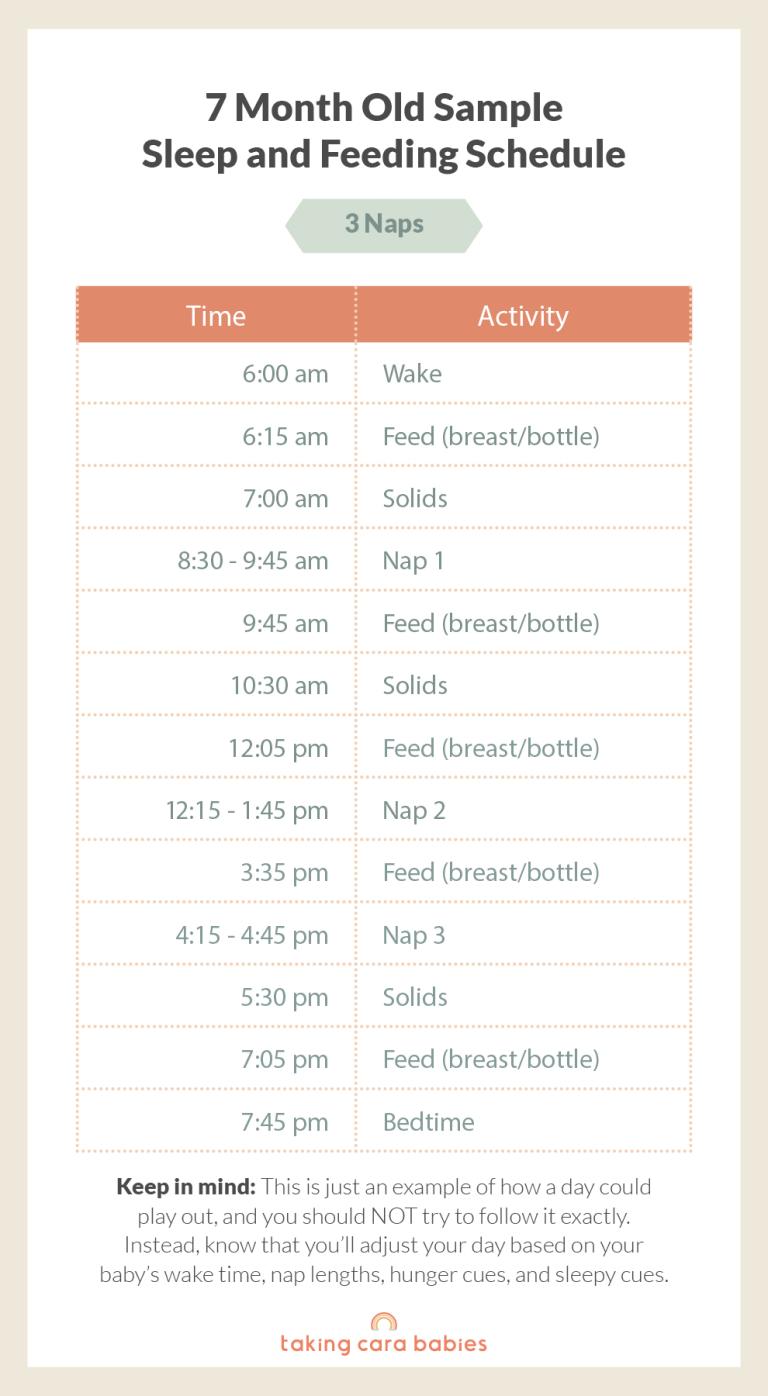
Text version of 3 Nap Schedule table
| Time | Activity |
|---|---|
| 6:00 am | Wake |
| 6:15 am | Feed (breast/bottle) |
| 7:00 am | Solids |
| 8:30 - 9:45 am | Nap 1 |
| 9:45 am | Feed (breast/bottle) |
| 10:30 am | Solids |
| 12:05 pm | Feed (breast/bottle) |
| 12:15 - 1:45 pm | Nap 2 |
| 3:35 pm | Feed (breast/bottle) |
| 4:15 - 4:45 pm | Nap 3 |
| 5:30 pm | Solids |
| 7:05 pm | Feed (breast/bottle) |
| 7:45 pm | Bedtime |
Parents: I want you to notice that this parent was following their baby’s hunger cues. Please be responsive to your baby’s hunger cues as you decide when to offer feedings. If you’re looking for more information on 7 month old feedings, check out this blog.
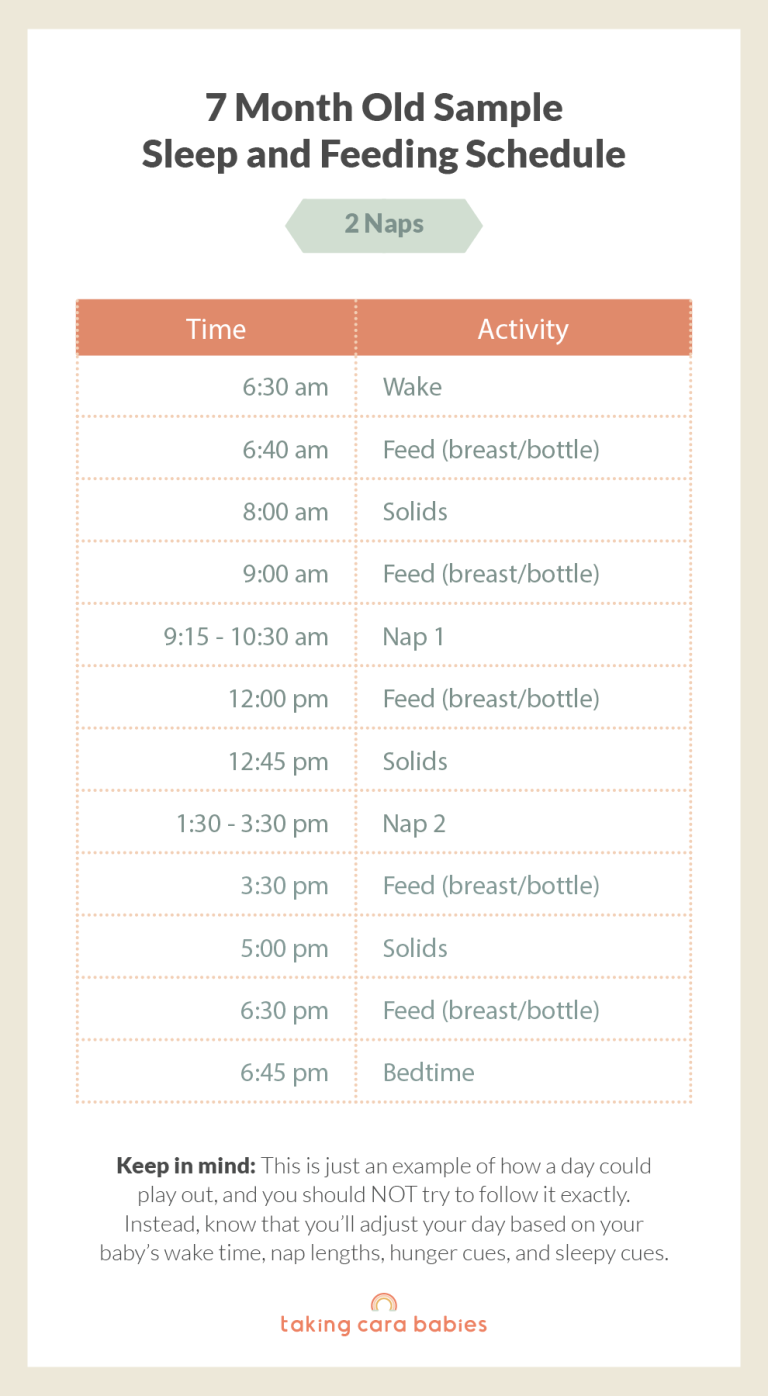
Text version of 2 Nap Schedule table
| Time | Activity |
|---|---|
| 6:30 am | Wake |
| 6:40 am | Feed (breast/bottle) |
| 8:00 am | Solids |
| 9:00 am | Feed (breast/bottle) |
| 9:15 - 10:30 am | Nap 1 |
| 12:00 pm | Feed (breast/bottle) |
| 12:45 pm | Solids |
| 1:30 - 3:30 pm | Nap 2 |
| 3:30 pm | Feed (breast/bottle) |
| 5:00 pm | Solids |
| 6:30 pm | Feed (breast/bottle) |
| 6:45 pm | Bedtime |
Parents: Just like in the 3 nap schedule, I want you to notice that this parent was following their baby’s hunger cues. Please be responsive to your baby’s hunger cues as you decide when to offer feedings. If you’re looking for more information on 7 month old feedings, check out this blog.
7 Month Sleep Schedule Guidelinesanchor
Every baby is unique and your little one’s day will depend on when your baby wakes, how long your baby naps, and individual cues. These age-appropriate guidelines are not intended to be a rigid schedule, simply a guide for setting up a flexible routine.
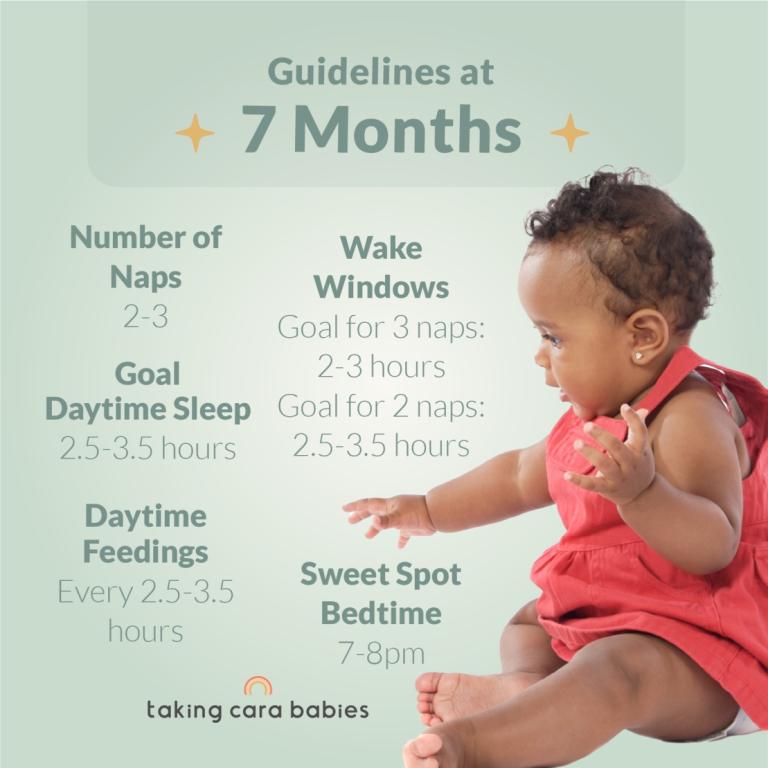
Text version of Guidelines at 7 Months table
| Daytime Feedings: | Every 2.5-3.5 hours |
|---|---|
| Goal Daytime Sleep: | 2.5-3.5 hours |
| Sweet Spot Bedtime: | 7:00-8:00 pm |
| Number of Naps: | 2-3 |
| Wake Windows: | |
| Goal for 3 naps: | 2-3 hours |
| Goal for 2 Naps: | 2.5-3.5 hours |
For more details on these recommendations, keep reading.
How many naps should a 7 month old take?anchor
A seven month old naps 2 to 3 times a day. Our total daytime sleep goal is is between 2.5 and 3.5 hours.
If you’re seeing less than 2.5 hours of total daytime sleep, be sure to check out my blog all about short naps.
Ideally, we want the first 2 naps of the day to be at least an hour, but we don’t want any one nap to exceed 2 hours. This will help ensure your baby has active awake time and that they get enough feedings during the day to help them sleep through the night.
Please Note: If you have a baby in daycare and you’re concerned about your baby’s nap schedule, check out my blog about daycare and baby sleep for more help.
When do babies drop the 3rd nap? anchor
The average age range for transitioning from 3 naps to 2 is 6.5-7.5 months old.
It may be time to drop the third nap if you see any of these signs:
Your baby is having difficulty falling asleep or staying asleep at nap time (when this wasn't a problem before).
Your seven month old’s third nap is getting so late it's interfering with bedtime.
Early morning wakings begin to appear or reappear because your baby is getting too much daytime sleep.
Keep in mind, nap transitions take time and consistency! It can take 2-4 weeks before your baby has fully transitioned from 3 naps to 2.
Expert Tip: When dropping a nap, we want to stay flexible with bedtime. You can move bedtime as early as 6:00 - 6:30 pm to adjust for missed daytime sleep and maintain a consistent 2 nap schedule (versus fluctuating between 3 and 2 naps).
If you need more help, my Conquering Naps class can walk you through this nap transition as well as help you have a great little napper from now until your child turns 2.
What is the ideal bedtime for a 7 month old?anchor
At seven months old, you still want to aim for the sweet spot bedtime between 7:00-8:00 pm. Babies who regularly have a bedtime after 8:00 pm may struggle to fall asleep, experience more false start bedtimes, and may even have more night wakings or early morning wakings.
Expert Tip: If your seven month old is transitioning from 3 naps to 2, we’ll want to be flexible with bedtime. Just before the transition to 2 naps, bedtime may be slightly after 8:00 pm. After the transition, bedtime may need to be moved as early as 6:00 to 6:30 pm as your baby adjusts to their new nap schedule. As you make bedtime adjustments, just remember the wake window prior to bedtime is 3-3.5 hours.
When should the last nap end for a 7 month old?anchor
Most seven month olds will need a 3 to 3.5-hour wake window prior to bedtime. Ending the last nap by 4:30 pm will allow that full wake window and help you hit a sweet spot bedtime of 7:00-8:00 pm.
Is there a 7 month sleep regression?anchor
We do often see a sleep regression between 8 and 10 months, but babies can experience sleep “regressions” for many reasons. If your baby’s sleep is suddenly disrupted, please know:
Sleep issues at seven months could be a sign it’s time to transition from 3 naps to 2.
Developmental strides happening around seven months – from an increase in physical abilities and mobility to emotional and cognitive abilities- can impact sleep.
An increase in distracted feedings around seven months affects sleep as well. Minimize distractions during feedings to prevent night wakings caused by hunger.
Separation anxiety may also begin to cause sleep problems at seven months.
What are 7 month old milestones? anchor
Each new milestone your baby achieves is so exciting — but every baby is different. So if another seven month old at daycare is sitting independently and your baby isn't, keep in mind that each baby progresses at their own developmental pace. Make sure to speak with your pediatrician if you have any questions or concerns about your baby meeting their milestones.
Physical Milestonesanchor
7 month old physical milestones are often broken into two categories: gross motor skills (think: the skills moving towards walking, jumping, etc.) and fine motor skills (think: picking up a piece of cereal, holding a pencil in the future). Some of the physical milestones that you might see at 7 months old are:
Sitting independently
Getting into a sitting position
Transferring objects from one hand to the other more fluidly
Supporting their body weight in a standing position when helped by an adult
Using a raking motion with their fingers to pick up an object
Cognitive Developmentanchor
Cognitive development includes problem-solving, communication, and more. Here are some of the cognitive milestones you might see at 7 months:
Using their voice to express joy or displeasure
Finding partially hidden objects
Babbling chains of consonant sounds
Banging toys on the floor or table
Bringing toys to their mouth
Social Developmentanchor
Social development includes the skills your baby learns to interact and bond with the people around them. Here are some social milestones at 7 months:
Playing near or interacting with others
Feeding themself finger foods
Grabbing or playing with feet
Expressing displeasure around leaving known caregivers
What are some ideas for activities for my 7 month old? anchor
Most seven month olds love putting objects in and out of a container, stacking objects, and reaching and grabbing toys.
Here are a few examples of what these activities can look like:
Place fabric, ribbons, and other objects in a tissue box, shoe box, or empty wipe container for your baby to pull out and stuff back in.
Try out Baby’s First Blocks. Though your seven month old is not expected to match the shapes, these blocks will encourage movement as they roll and wobble.
Practice crawling skills by placing a toy just out of reach.
Need to stretch a wake window? Take a little walk around the block describing what you see and allow your baby to interact with nature (Think touching the grass, smelling the flowers, or pointing at birds.)
I have some favorite toys for seven month olds here.
Is your 7 month old still struggling with sleep?anchor
The 5–24 Month Collection will help! Let me show you how to meet your baby where they are developmentally using a holistic and customizable approach. My classes provide you with the guidance and support you need to navigate sleep regressions, manage nap troubles, work towards consolidated nighttime sleep, and more! It’s never too late to have a great little sleeper.
Still have a 6 month old? Check out 6 month sleep schedules. Already have a 8 month old? I've got you covered with my 8 month sleep schedules.
7 Month Old Sleep FAQanchor
-
Wake windows this month may start in the 2-3 hour range, but will expand to around 2.5-3.5 hours as your baby gets closer to eight months old.
-
If sleep is a struggle for your 7 month old, consider some of these common culprits:
- Sickness or teething
- Being ready for increased wake windows
- Needing to drop a nap and/or too much daytime sleep
- Developmental progression
Another major reason that your 7 month old may struggle is that they simply don’t have the foundational skills needed to sleep independently. Not sure how to teach this? The 5–24 Month Collection will give you a step-by-step plan to 10-12 hour nights in the crib. It will cover bedtime, night wakings, night weaning, early morning wakings, and naps through the first two years of life.
-
Short naps can be so tough. There can be several reasons your seven month old is taking short naps. First, look at your baby’s sleep environment. Is it good for sleep? Dark, cool, comfortable, and humming with the noise of a sound machine? If the napping environment is on point and naps are still short, consider these other reasons your baby may be taking short naps.
-
Yes! Babies are usually developmentally ready for sleep training by five months old, which means it is okay for your seven month old. But, the best time to sleep train is when you decide this is the right choice for your family. If you’re not sure, I’d love to share the story of how I decided sleep training was right for my family. If you decide you’re ready for sleep training, it’s so important to have a plan and guidance you can trust. My 5–24 Month Collection will do just that: I’ll teach you everything you need to know to have a great little sleeper, while remaining emotionally connected and present every step along the way.
-
I love sleep sacks. A sleep sack is a sleeveless zip-up bag your baby can wear at night (instead of using a blanket). I recommend them because they’re safe, keep your baby at a comfortable temperature, and help cue the brain that it’s time for sleep. Check out my blog all about Sleep Sacks to learn more.
References
10 Sources
American Academy of Pediatrics. (2022). Sleep-Related Infant Deaths: Updated 2022 Recommendations for Reducing Infant Deaths in the Sleep Environment
Brown and Harries. (2015). Infant Sleep and Night Feeding Patterns During Later Infancy: Association with Breastfeeding Frequency, Daytime Complementary Food Intake, and Infant Weight
Mindell et. al. (2008). Developmental aspects of sleep hygiene: Findings from the 2004 National Sleep Foundation Sleep in America Poll
Mindell and Williamson. (2017). Benefits of a bedtime routine in young children: Sleep, development, and beyond
Paruthi et. al. (2016). Recommended Amount of Sleep for Pediatric Populations: A Consensus Statement of the American Academy of Sleep Medicine
Tham, Schneider, and Broekman. (2017). Infant sleep and its relation with cognition and growth: a narrative review
Dadzie et al. (2025). Associations Between Sleep Health and Child Behavior at Age 6 Years in the INSIGHT Study
Paul et al. (2016). INSIGHT responsive parenting intervention and infant sleep
Mayo Clinic. (2022). Infant Development: Milestones from 7 to 9 Months
Healthy Children, American Academy of Pediatrics. (2009). Developmental Milestones: 7 Months
Keep in mind that the information and content on this blog is for informational purposes and should not be considered medical advice. If you have questions about your child, please reach out to your doctor.

